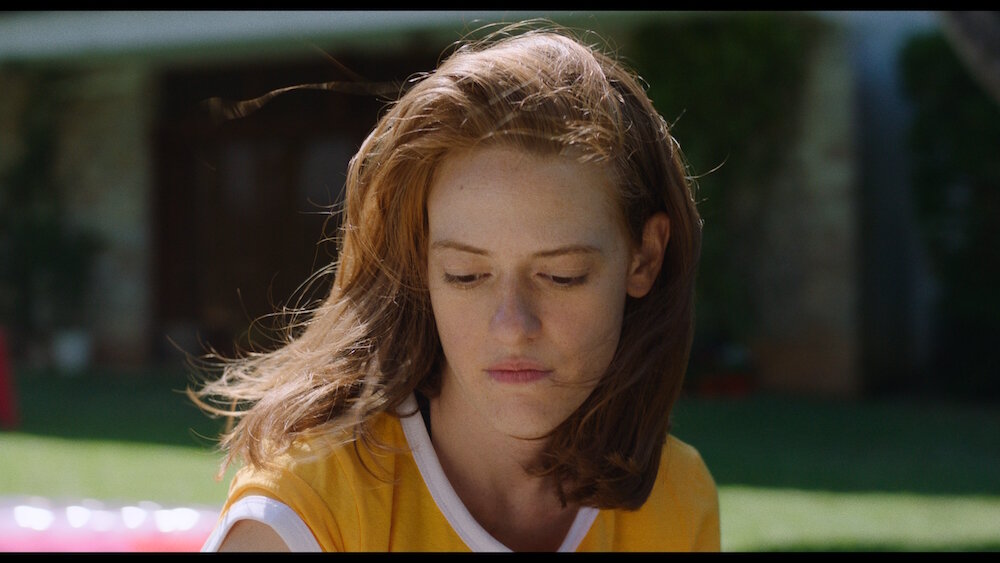‘Moon, 66 Questions’ is Jacqueline Lentzou’s first feature film. She has directed quite a few shorts which premiered in A-list festivals like Berlin, Cannes, Locarno and Toronto. Her background includes poetry, art and she graduated from the London Film School.
At the center of the story by the Greek native is a troubled father/daughter relationship, revisited when the father Paris, played with stunning vulnerability by Lazaros Georgakopoulos, develops Multiple Sclerosis or MS. The daughter Artemis, a force of nature in the masterful hands of actress Sofia Kokkali, ends up becoming his full time carer and in the process not only discovers something about her father she never knew, but also ends up finding herself. It’s a touching story, like a Greek tragedy but told carefully and with more nuances, possessing hints of pop culture — like a mention of Gena Rowland’s birthday from Artemis’ diary — and a nod at the stars above us, as the title suggest. Tarot cards are shown as placeholders for the various chapters of the film and music is blasted from the car stereo when Artemis decides to wash the family car.
Personally, the film held familiar themes which made it difficult to watch at times, but always right on the mark! I too took care of a loved one after an accident which left them paralyzed on the left side of their body. I too had to do it all, and they would have been completely lost without me. There is something wonderful in being there for our beloveds in a moment of need but it’s also incredibly hard to watch those who were the embodiment of strength for us fall apart. It feels a lot like walking on the edge of a precipice, with one hand out to keep our balance and the other holding on to our dear one.
Lentzou shows that razor’s edge really masterfully in her film, which world premiered at this year’s Berlinale.
Following is our interview conducted via email, untouched and uncut.
This story of a daughter coming to the aid of her father, is there a personal angle to it?
Jacqueline Lentzou: There is always a personal angle in everything I write, make or dream about making.
When did you know you needed to make this film?
Lentzou: The August full-moon of 2015.
The film takes place in Greece but don’t you think it’s a universal story? Did you ever think of setting it somewhere else?
Lentzou: Sure, it is a universal story, like any love story. Yet, I wanted my first feature film to be in my country and in my language.
Your collaboration with Sofia Kokkali, what makes her such a muse to your filmmaking?
Lentzou: I don’t feel Sofia is my ‘muse’, I don’t feel comfortable with this word, sounds a bit heavy for no reason.
Sofia is my friend -with the richest definition of the word. We communicate at an intellectual as well as at an emotional level, and I guess this is the key. Real communication.
There are hints of magic and more specifically astrology (for lack of a better word) in your film. How does that impact your own life and why did you decide to include it in the film?
Lentzou: The protagonist suffers greatly and in various textures. In the meanwhile, the soul of the film lies in the following sentence: ‘I don’t know, but I want to know by any means, and I will know at the end, as knowing can help me not suffer anymore’
Existential suffering, at least according to my long experience, stems from the lack of knowing and believes –falsely- it will be relieved by knowing. Knowing the cause of something, or the reason behind another thing, or even the meaning of life.
This is where astrology, prediction tools, even faith pops in. To create an illusion of safety.
Lazaros Georgakopoulos does an incredible job at convincing us that he’s sick, in real life, with MS. I had to look it up! How did you cast him and how did he come to inhabit this role of Paris so well? Physicality and all…
Lentzou: I am deeply content whenever I receive such comments for Lazaros Georgakopoulos’ performance, as it was such a high risk for me as as writer/director. If Lazaros was not as superb as he is in Paris’ role, half the film would be weak.
Now, due to his amazing performance, the film has a special strength, coming out of the performance of a paraplegic guy – how ironic, right?
We were assisted significantly by Vicky Panagiotaki, the only Alexander Technique Practitioner in Greece, and they did a miraculous job in the physicality part. As far as the psychology of the character, I had Roland Barthes’ book ‘A lover’s discourse’ as a bible – a book I have as a bible in life in general- and at the same we worked a lot with guilt. After all, the film suggests that Paris’ body literally froze, as he was feeling guilty for the fact that he loved another man. This is why his silence is so loud.
What would you like your viewers to take away from your film?
Lentzou: That the greatest act of love is not self-sacrifice, but pure acceptance. And above all, that under no circumstances love should be hidden or punished or not allowed. Ever!
And how has your vision changed, or even perhaps stayed the same, during these difficult pandemic times?
Lentzou: I have been having my vison for years, although the pandemic is only new. The latter is impossible to change the first.
‘Moon, 66 Questions’ screens as part of the online Berlinale, which runs from March 1st to the 5th, 2021.

